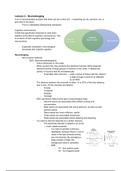Grammatica A: la voix passive
Zinnen kunnen in de actieve (bedrijvende) vorm staan of in de passieve (lijdende) vorm staan. Bij de
passieve vorm staat de handeling centraal en niet de persoon die de handeling verricht. Soms is het niet
eens duidelijk wie de handeling uitvoert. In het Frans maak je de passieve vorm met être + vd + par (door).
Voorbeeld:
onderwerp lijdend voorwerp
Les journalistes écrivent beaucoup d’articles. (voix active)
Beaucoup d’articles sont écrits par les journalistes. (voix passive)
Van een actieve zin een passieve zin maken:
1) Maak het lijdend voorwerp in de actieve zin het onderwerp van de passieve zin.
2) Bepaal de tijd van de actieve zin en zet être in dezelfde tijd in de passieve zin.
3) Zet het hoofdwerkwoord uit de actieve zin om in een voltooid deelwoord in de passieve zin.
4) Zet het onderwerp uit de actieve zin achter par.
Voorbeeld:
Mes parents versent mon argent de poche sur mon compte en banque. (voix active)
Mijn ouders maken mijn zakgeld over op mijn bankrekening.
Mon argent de poche est versé sur mon compte en banque par mes parents. (voix passive)
Mijn zakgeld wordt op mijn bankrekening overgemaakt door mijn ouders.
Als het niet duidelijk is wie het onderwerp is in de actieve zin bijvoorbeeld bij on en ils, dan krijg je geen
par in de passieve zin.
Voorbeeld:
On payera une partie du montant. (voix active)
Une partie du montant sera payée. (voix passive) Je zet er dus niet achter par on.
Passieve zinnen kunnen in alle werkwoordstijden voorkomen. Je moet dus alle vormen van être
kennen:
Être Être
Present je suis Passé composé j’ ai été
tu es tu as été
il/elle/on est il/elle/ a été
nous sommes on
vous êtes nous avons été
ils/elles sont vous avez été
ils/elles ont été
Être Être Être
Imparfait j’ étais Futur je serai Present je serais
tu étais tu seras tu serais
il/elle/on était il/elle/on sera il/elle/on serait
nous étions nous serons nous serions
vous étiez vous serez vous seriez
ils/elles étaient ils/elles seront ils/elles seraient
Grammatica B: de onregelmatige werkwoorden
Valoir Craindre Résoudre Lire
(waard zijn) (vrezen) (oplossen) (lezen)
Present je vaux crains résous lis
tu vaux crains résous lis
Zinnen kunnen in de actieve (bedrijvende) vorm staan of in de passieve (lijdende) vorm staan. Bij de
passieve vorm staat de handeling centraal en niet de persoon die de handeling verricht. Soms is het niet
eens duidelijk wie de handeling uitvoert. In het Frans maak je de passieve vorm met être + vd + par (door).
Voorbeeld:
onderwerp lijdend voorwerp
Les journalistes écrivent beaucoup d’articles. (voix active)
Beaucoup d’articles sont écrits par les journalistes. (voix passive)
Van een actieve zin een passieve zin maken:
1) Maak het lijdend voorwerp in de actieve zin het onderwerp van de passieve zin.
2) Bepaal de tijd van de actieve zin en zet être in dezelfde tijd in de passieve zin.
3) Zet het hoofdwerkwoord uit de actieve zin om in een voltooid deelwoord in de passieve zin.
4) Zet het onderwerp uit de actieve zin achter par.
Voorbeeld:
Mes parents versent mon argent de poche sur mon compte en banque. (voix active)
Mijn ouders maken mijn zakgeld over op mijn bankrekening.
Mon argent de poche est versé sur mon compte en banque par mes parents. (voix passive)
Mijn zakgeld wordt op mijn bankrekening overgemaakt door mijn ouders.
Als het niet duidelijk is wie het onderwerp is in de actieve zin bijvoorbeeld bij on en ils, dan krijg je geen
par in de passieve zin.
Voorbeeld:
On payera une partie du montant. (voix active)
Une partie du montant sera payée. (voix passive) Je zet er dus niet achter par on.
Passieve zinnen kunnen in alle werkwoordstijden voorkomen. Je moet dus alle vormen van être
kennen:
Être Être
Present je suis Passé composé j’ ai été
tu es tu as été
il/elle/on est il/elle/ a été
nous sommes on
vous êtes nous avons été
ils/elles sont vous avez été
ils/elles ont été
Être Être Être
Imparfait j’ étais Futur je serai Present je serais
tu étais tu seras tu serais
il/elle/on était il/elle/on sera il/elle/on serait
nous étions nous serons nous serions
vous étiez vous serez vous seriez
ils/elles étaient ils/elles seront ils/elles seraient
Grammatica B: de onregelmatige werkwoorden
Valoir Craindre Résoudre Lire
(waard zijn) (vrezen) (oplossen) (lezen)
Present je vaux crains résous lis
tu vaux crains résous lis



